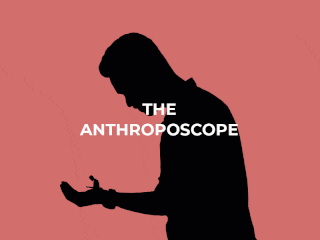A metaphysical approach to understanding the state of the Anthropocene would involve questioning how (and why) must one analyze or delve into earth’s epoch saga: What is the position that one assumes specifically while approaching an understanding of this subject? Is one the pawn in the game, or an observer? In the scale of deep time, the life of a human is but a little scintillation. It is the through media cultures (however rudimentary), collective knowledge and the altruistic (survivalist?) wisdom that this landscape of scintillations has turned into the big, bright and blinding mushroom cloud that we now term the Anthropocene.

A growing interest in the vestiges of media culture and its effects on our planet is indeed encouraging, but it is counterintuitive to approach it with an Anthroposcopic vision. Is a human being– the very basis of the etymology of the term Anthropo(obs)cene, an ideal candidate to analyze this condition? What are the affordances in the perception of time and scale that affect the human standpoint?
One can imagine how it is difficult (though not impossible) for a human to objectively observe the human condition. On the chessboard, a pawn sees immediate dangers to its survival and through simple mathematical induction, is able to anticipate the effect its situation will have on itself and its fellow pawns. Interestingly though, this is a decidedly narrow view that focuses on winning and survival of the species (or the side in the chess game analogy).
Anthropos – having to do with humans. Humans– an organism that has naturally evolved on the planet and undoubtedly, a part of nature (in a Deleuzian sense). The activity through which this organism has affected the earth is also a part of nature: the destruction of the green along with the construction of the grey goes hand-in-hand with the grey mass in the human brain and its consequential intellect. Is the excess of grey metaphors the Darwinian limiter of our species?
It is interesting to ponder where it will go, but rather anthropocentric to worry about it! What’s really amusing is our dependence on media infrastructure to even discuss, analyze and educate our opinions on it– all because of how much human survival depends upon it. To call the anthropocene the Anthrobscene then becomes almost a self-elevating exercise– knowing ones’ shortcomings somehow absolves the shortcoming itself.
The massive control system that is the planet earth runs multiple processes (climate, water, soil, etc.) and is in itself a part of an even bigger control system – the Solar system. These systems vary not only in terms of physical scale but also on the scale of time. At which point in these systems do we place ourselves such that the dreadful ontology of using media culture to talk about the affectations of media culture doesn’t contribute to the obscenity of the so-called Anthrobscene?
Is this an altruistic (but ultimately anthropocentric) exercise in redeeming our species or is it rather an outcome of the collective messianic tendencies of the enlightened (educated) cream?



